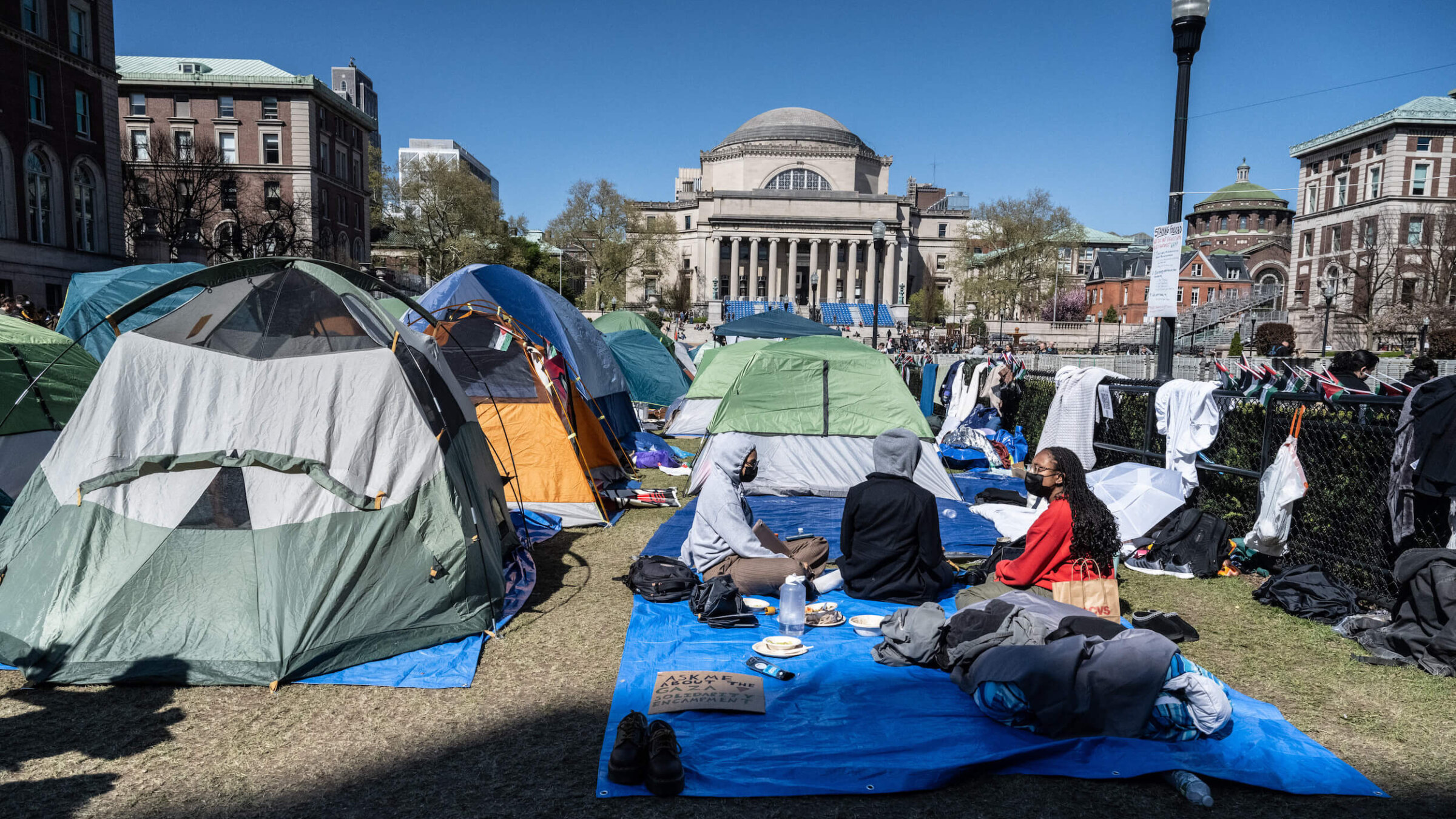Yes, antisemitism is rising. But pro-Palestinian protests aren’t the real threat to our campuses
University administrations are complicit in a political movement that’s making students feel more insecure

Pro-Palestinian demonstrators at an encampment at Columbia University. Photo by Stephanie Keith/Bloomberg/Getty Images
Something is broken at our universities: Our sense that we are all in this together.
I teach at Rutgers, which is among the most diverse universities in the nation. Both its Jewish and Muslim populations are among the largest in American higher education. Our communities have long existed side by side, and we will continue to do so.
Or, at least, I hope we will. The Rutgers administration’s increasing crackdowns on pro-Palestinian protests — mirroring a troubling trend nationwide — have put our diverse future at risk.
Rutgers, New Jersey’s flagship public institution of higher education, suspended Students for Justice in Palestine for several months during the winter, and it issued veiled threats to the organizers of a planned pro-Palestine walkout earlier this month. It also has ignored broad support among the student body for divestment of university funds from Israel; a proposal advocating that action won about 80% support from students during an April referendum. The university’s refusal to consider the idea led to the raucous shouting down of President Jonathan Holloway during a recent town hall.
But the crackdowns at Rutgers have been comparatively mild. The well-paid presidents of Columbia, Yale and New York University have this week summoned police to break up protest encampments, working to silence the speech of students who are demanding justice for Palestinians. A number of faculty at all three institutions have participated in the protests, and objected to the involvement of the police.
Politicians, along with many establishment Jews — like Jonathan Greenblatt, head of the Anti-Defamation League, who suggested the National Guard might need to be called in to Columbia — have tossed around broad accusations of antisemitism against these protesters, conflating criticism of Israel with hatred or discrimination of Jews as Jews, even as many of those protesting are Jewish.
There is no doubt that real antisemitic incidents have occurred during these protests, or that antisemitism on campus has become a more serious problem since Oct. 7. Several of my students have told me of incidents they’ve experienced at Rutgers: friends asking them why they have not “renounced their Judaism,” for example, or groups of pro-Palestinian students seating themselves near visibly Jewish students and speaking loudly about Zionists and Palestine.
Yet the number of reported antisemitic incidents on my campus has increased only by a small amount. And, in a trend that seems to draw much less concern from campus and political authorities, there has been an equivalent rise in similar incidents against Arab and Muslim students.
Most recently, on April 10, at the beginning of Eid al-Fitr — the three-day celebration of the end of Ramadan — the Center for Islamic Life at Rutgers University was vandalized. Artwork containing verses from the Koran was smashed, the building was ransacked, and a Palestinian flag was ripped down and stolen. Police have arrested and charged a suspect, Jacob Beacher, with a federal hate crime.
But timing and context matter. Desecrating a Muslim center during Ramadan is a particularly charged violation. Yet the campus environment the administration has helped foster — one in which people have become quick to read bias or bigotry into even well-intentioned language — made it difficult to discuss as such.
The day after the vandalism, I showed one of my classes an ABC news report about it — a standard feature of journalism classes. My intention was to let the students offer their emotional responses to what had happened on their campus, while also spending time critiquing the news report and several articles about this incident.
I knew an assignment so close to home might be uncomfortable for some students, but this was a major news story taking place where they live and learn — something every aspiring journalist must learn to cover. Still, I was surprised by how conscious I felt of the language I was using, and how the video was being received. My status as an adjunct — a part-time instructor with limited job security — gave me pause.
How would the Jewish students in my class react to my discussion, which focused on the ways in which the report failed to fully address the campus environment amid the war in Gaza, including the referendum on divestment and ensuing outburst at the president’s town hall?
I was wading into controversial territory, and I was aware that there could be consequences. We have an active adjunct union at Rutgers — I serve on the executive board — but still, many instructors are forced to balance their right to speak openly in their classrooms in the name of education against their desire to keep a hold on a tenuous job. The urge to self-censor and avoid difficult topics has always been there; this was the first time I’d felt it so strongly.
This is a response to a climate of fear and distrust that’s been exacerbated by administrators; Jewish leaders like Rutgers Hillel CEO Lisa Harris-Glass, who compared the current climate to Germany in the 1930s; and Republican politicians like Reps. Elise Stefanik and Virginia Fox, who have accused Palestinian and Muslim students of using genocidal language.
Some of these figures have wrongly described Rutgers as hostile to Jews, mostly due to their willful misinterpretation of protest language and slogans. They seek to redefine speech as harassment, and to shut down discussion and debate.
The result: A university that has come to lack the kind of intellectual humility we all need to exhibit, and which infuses — regardless of truth — any pro-Palestinian protest with the specter of antisemitism. Universities are supposed to be places in which ideas are tested through rigorous research and debate, places of learning. Efforts to clamp down on that very process when it comes to Palestine and Israel undermine the whole system. This — not students protesting a devastating war they see as inexcusable — is what is broken.
















